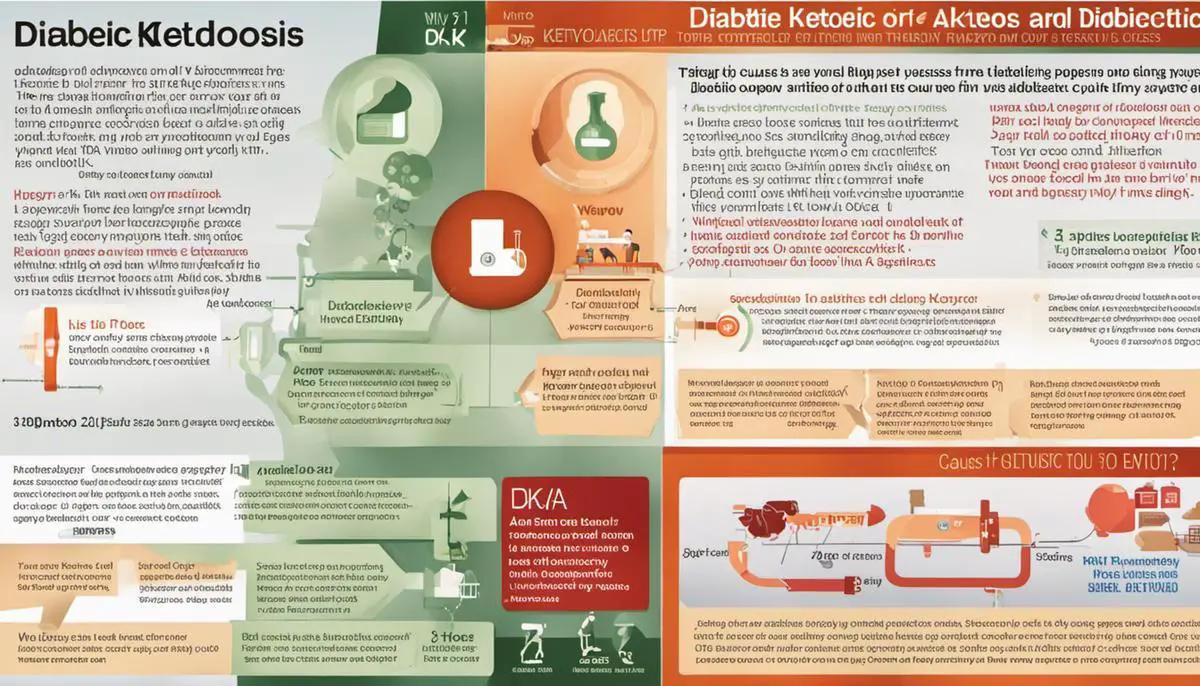Diabetic Ketoacidosis (DKA), a formidable complication of diabetes, has widespread implications in the lives of countless individuals across the globe. Rooted in the dynamics and idiosyncrasies of diabetes, the devastating effects of DKA are further exacerbated by factors such as stress. This comprehensive exploration serves not only as an elucidation of DKA, its causes, symptoms, and treatments but also secures a keen insight into the profound interplay between stress and diabetes. Unraveling the layers of this intricate relationship elucidates how various forms of stress physiologically pivot blood sugar levels, thereby influencing the occurrence and severity of DKA.
Explanation on DKA
Understanding Diabetic Ketoacidosis (DKA)
Diabetic Ketoacidosis (DKA) is a severe, life-threatening complication that occurs when your body runs low on insulin and your blood sugar becomes exceedingly high. Insulin, a hormone produced by the pancreas, helps glucose (sugar) enter cells to provide energy to the body. When insulin levels are low, the body starts breaking down fat as an alternative energy source, which in turn produces a high amount of acids known as ketones. An overload of ketones can lead to DKA causing the individual to experience diabetic ketoacidosis symptoms.
Diabetic Ketoacidosis Causes
DKA is usually caused by insulin deficiency due to the body not producing enough insulin, or not using insulin properly. This can be triggered by certain physiological stressors and medical conditions such as urinary tract infections, pneumonia, heart attack, or severe physical trauma. Non-adherence to insulin therapy, or inadequate insulin therapy, can also lead to DKA.
Symptoms of Diabetic Ketoacidosis
The onset of DKA symptoms is usually rapid, developing over 24 hours. Key symptoms include frequent urination, high blood glucose levels, high levels of ketones in the urine, and extreme thirst. Other symptoms may include fatigue, confusion, abdominal pain, shortness of breath, dry skin or mouth, fruit-smelling breath, and a rapid heartbeat.
Complications of DKA
DKA is a serious condition that can lead to various complications if left untreated. It can cause dehydration, kidney damage, cerebral edema (brain swelling), and coma. It may also lead to diabetic coma or even death. Therefore, timely and appropriate treatment is critical for patients diagnosed with DKA.
DKA Treatments
The primary treatment for DKA involves replacing lost fluids and electrolytes, managing high blood sugar levels, and treating the underlying cause that led to DKA. This usually includes intravenous (IV) hydration, insulin therapy, and electrolyte replacement and is typically done in a hospital.
DKA and Susceptibility
DKA is more commonly seen in people with type 1 diabetes but can also affect people with type 2 diabetes. It’s more likely to occur in those who are young, black or Hispanic, lack access to regular healthcare, or suffer from an eating disorder or alcohol misuse.
Understanding DKA and the Impact of Stress
Stress can trigger the release of several hormones that can potentially increase blood sugar levels. This means that individuals who struggle with managing their stress levels may frequently have high blood sugar levels, which in turn increases their chances of developing DKA. Moreover, chronic conditions, such as anxiety and depression may result in inconsistent self-care practices, such as irregular medication intake. This may lead to poor glycemic control, subsequently heightening the risk of DKA.

The Role of Stress in Diabetes
Unraveling the Interplay between Stress and Diabetes
Stress holds a pivotal role in both the onset and progression of diabetes – a persistent illness characterized by elevated blood sugar levels due to the body’s inefficient production or utilization of insulin, which regulates blood sugar. Various kinds of stress, such as physical, mental, and emotional stress, can influence blood sugar levels, and thus, the overall management of diabetes. This reiterates the necessity for managing stress levels to avoid exacerbating diabetic conditions.
Different Types of Stress
Physical stress refers to situations where the body undergoes perceptible strain, such as in the cases of illness, injury, or intense physical activity. Mental stress, on the other hand, involves cognitive strain, which often comes with situations that require intense focus and mental exertion. Emotional stress involves the subjective experience of stress related to feelings, emotions, and psychological responses to events or situations. Any of these stress types can lead to a stress reaction in the body that, among other responses, results in elevated blood sugar levels.
Body Response to Stress
When the body perceives stress, it initiates a fight-or-flight response, an evolutionary adaptation designed to equip the body to either confront or flee from a perceived threat. This response stimulates the release of various hormones such as adrenaline and cortisol. These hormones trigger the liver to produce more glucose, a type of sugar, for an energy boost, thereby increasing blood sugar levels. In individuals without diabetes, the pancreas responds accordingly by producing more insulin to transport sugar from the blood into cells. However, in individuals with diabetes, this mechanism is flawed, resulting in increased blood sugar levels.
Stress and High Blood Sugar
Chronic stress causes long-term activation of the stress reaction, leading to an almost constant state of elevated blood sugar levels in diabetic individuals. The correlation between stress and high blood sugar levels is complex, but it’s believed that stress hormones interfere with insulin secretion and function, thereby worsening diabetes control.
Chronic Stress and Development of Diabetes
Severe and persistent stress can also increase the risk of developing diabetes in non-diabetic individuals. Chronic exposure to stress hormones and activation of the nervous system can influence the development of metabolic syndrome, a cluster of conditions that increase the risk of heart disease, stroke, and type 2 diabetes. These conditions can disrupt normal insulin function, leading to insulin resistance and eventually diabetes, if not properly managed.
Stress and its Link to Diabetic Ketoacidosis (DKA)
Stress is widely identified as a key triggering factor for diabetic ketoacidosis (DKA), a severe, potentially life-threatening complication commonly found in individuals living with diabetes, especially those battling with type 1 diabetes. DKA is primarily caused by the body’s inability to efficiently utilize sugar as an energy source because of the scarcity of insulin. This deficiency prompts the body to resort to fat breakdown for its energy requirements, leading to the creation of harmful substances known as ketones. When present at high levels, these ketones can cause the blood to become too acidic. Stress exacerbates this issue by causing an increase in blood sugar levels, consequently heightening the risk of developing DKA.

The Impact of Stress on DKA
Getting to Grips with Diabetic Ketoacidosis (DKA)
Diabetic ketoacidosis (DKA) is a major medical emergency, primarily diagnosed in people with type 1 diabetes. However, it can affect individuals with type 2 diabetes who are coping with extreme stress or illness. Recognizing DKA quickly is crucial, as it is defined by strikingly high blood glucose levels, ketones in urine, and a situation called metabolic acidosis.
When insulin levels are too low to help the body utilize glucose, the body resorts to breaking down fat stores for its energy needs. The by-products of this process are acids or ketones, which build up in the blood. In excess quantities, these ketones become toxic, potentially leading to DKA. Symptoms to watch out for include extreme thirst, frequent urination, nausea, vomiting, shortness of breath and, in severe cases, loss of consciousness. Prompt diagnosis and treatment of DKA are crucial to prevent serious complications.
The Link Between Stress and DKA
Stress, both physical and psychological, has a profound impact on diabetes management and can contribute to incidents of DKA. Stress prompts the body to release certain ‘stress hormones’ such as cortisol, adrenaline, and glucagon. While these hormones are vital for survival as they prepare the body for the ‘fight or flight’ response, they can negatively impact individuals with diabetes by increasing blood glucose levels. This rise can be even more problematic when combined with a lack of adequate insulin, promoting the development of DKA.
Physical stressors, like illness or injury, can directly impact glucose metabolism. For example, infection can lead to increased insulin resistance, thereby enhancing the risk of DKA. Similarly, psychological stress resulting from factors such as work-related stress or personal crises can also induce a physiological stress response, thereby elevating blood glucose levels.
Stress Management and DKA Prevention
Effective stress management is an essential part of managing diabetes and by extension, preventing DKA. Various techniques, such as deep breathing exercises, yoga, meditation, and other relaxation practices, can help lower stress levels. Good sleep habits and regular exercise are additional strategies to maintain optimal blood sugar balance and reduce the risk of DKA.
Don’t overlook the importance of a well-rounded, nutritional diet. It’s essential for managing glucose levels and reducing the risk of DKA. Carb counting, consuming high-quality proteins and fats, as well as eating a variety of fruits and vegetables, can support glycemic control.
Moreover, adhering to a diabetes care plan provided by healthcare professionals can help manage blood glucose levels more effectively. This often involves monitoring blood glucose and ketone levels regularly, adjusting insulin doses as necessary, and understanding what to do in the event of experiencing symptoms of DKA.
Exploring the Connection between Stress and DKA
There appears to be a clear link between elevated stress levels and the onset of Diabetic Ketoacidosis (DKA) based on certain research studies. A key example can be seen in a study from the Annals of Clinical and Translational Neurology, which showed increased hospital admissions for DKA during academic examination periods, implying a link between stress from examinations and the emergence of DKA. Further reinforcing this link, research published in Diabetes Care highlights that psychosocial stress played a significant role in the development of DKA among children and adolescents with Type 1 Diabetes.
In other words, stress – both psychological and physical – appears to significantly increase the likelihood of developing DKA. Thus, one effective approach to preventing this dangerous diabetic complication is effective stress management.

Stress Management and DKA Prevention
Digging Deeper into DKA and the Impact of Stress
Diabetic Ketoacidosis, commonly abbreviated as DKA, is a serious, potentially fatal complication of diabetes that arises when the body doesn’t have adequate insulin levels. Insulin is a hormone that enables sugar, also known as glucose, to enter our cells, providing them with the energy they need. In the case of an insulin deficit, the body starts breaking down fat for energy, resulting in an accumulation of acids called ketones in the bloodstream. If not addressed in time, this process can lead to the onset of DKA.
Stress Management Techniques
Effective stress management can help reduce the chance of DKA occurrences.
Exercise: Regular physical activity can help lower blood sugar levels and alleviate stress. It also improves insulin sensitivity, which can aid in the prevention of DKA.
Mindfulness and Meditation: Mindfulness exercises and meditation can help reduce stress levels. These techniques help encourage relaxation and promote a more positive outlook, which can contribute to better diabetes management.
Counseling or Therapy: For chronic or severe stress, professional help may be beneficial. Counselors and therapists can provide tools and techniques to handle stressors effectively and improve coping strategies.
Lifestyle Changes for Better Diabetes Control
Alongside stress management, other lifestyle adjustments can improve blood sugar control and lower the risk of DKA.
Dietary Changes: Consuming a healthy, balanced diet, low in simple carbohydrates and high in fiber, can help manage blood sugar levels. Regular mealtimes can also ensure your body receives necessary glucose and insulin at consistent intervals.
Regular Monitoring of Blood Glucose Levels: Frequent monitoring of blood glucose levels can help identify potential issues early. It allows for immediate action to adjust medication or insulin dosages, potentially preventing DKA.
Remaining Hydrated: Dehydration can promote DKA. Therefore, drinking plenty of fluids is crucial for individuals with diabetes.
Having a DKA Plan
Having a plan for potential DKA scenarios is crucial. This can involve knowing what symptoms to look for (e.g., high blood sugar levels, excessive thirst, frequent urination), maintaining an updated medical ID, and having necessary supplies on hand (e.g., extra insulin, a blood glucose meter).
Moreover, getting regular check-ups, tracking your blood glucose levels, educating yourself about DKA, and having open communication with your healthcare provider can contribute significantly to DKA prevention and overall diabetes management in the face of chronic stress.

Ultimately, illuminating the close-knit connection between stress and DKA offers a pathway towards understanding preventative measures for this severe diabetic complication. Adaptability and resilience in the face of stress begin by integrating effective management techniques into daily life. A potent tool for defying the adverse implications of diabetes, these tactics temper the body’s stress responses and promote healthier blood glucose levels. As we navigate this ongoing journey, the pivotal role of prolonged stress management in precluding DKA becomes unmistakably apparent. The knowledge and comprehension gained from this synthesis can significantly augment the robustness of our campaign against DKA, opening doors for a healthier future for diabetics around the world.
